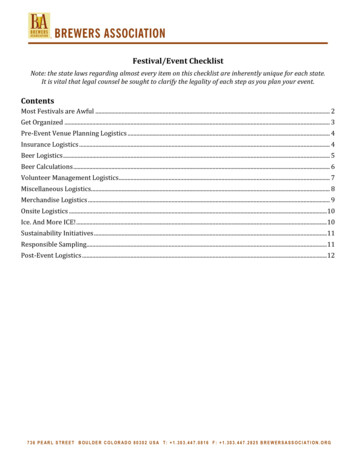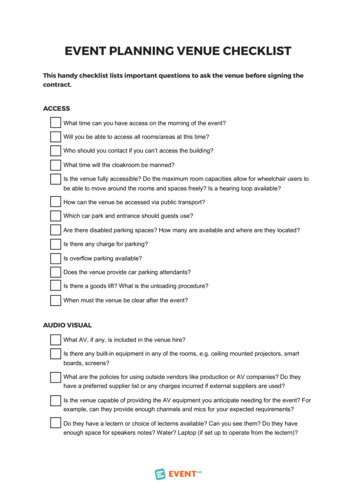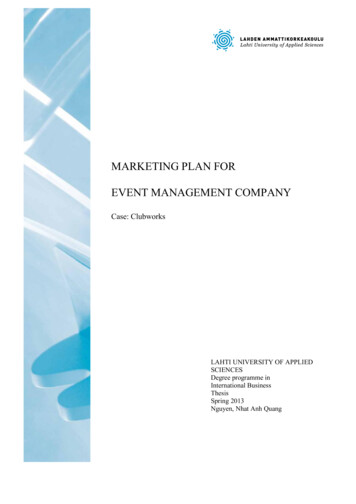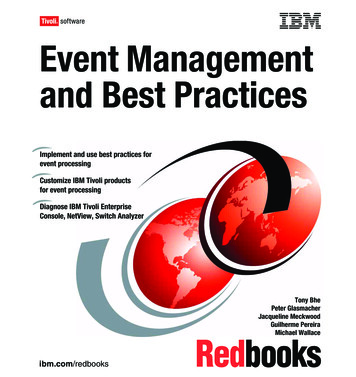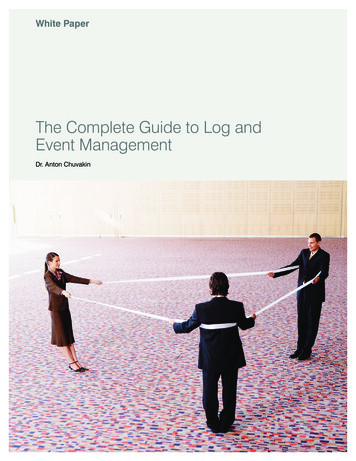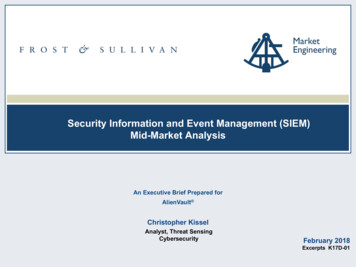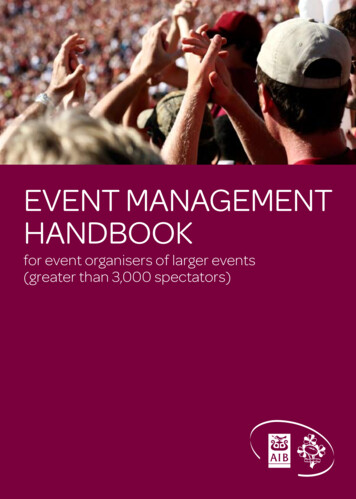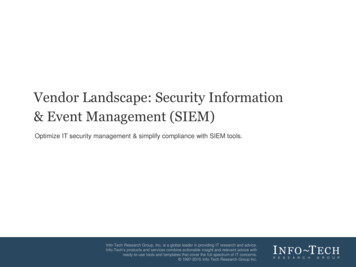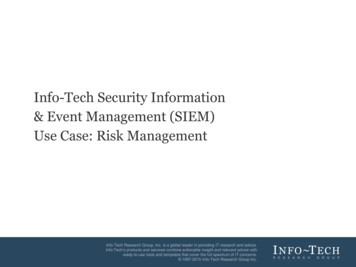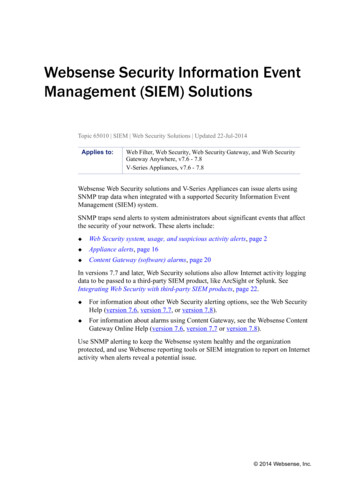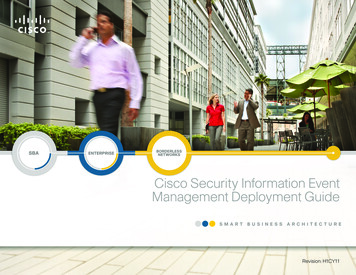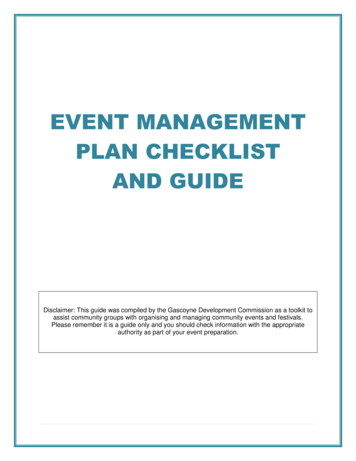
Transcription
EVENT MANAGEMENTPLAN CHECKLISTAND GUIDEDisclaimer: This guide was compiled by the Gascoyne Development Commission as a toolkit toassist community groups with organising and managing community events and festivals.Please remember it is a guide only and you should check information with the appropriateauthority as part of your event preparation.
TABLE OF CONTENTSINTRODUCTION . 4EVENT PLAN . 41. EVENT DETAILS . 51.1. Event Place & Time . 51.2. Contact During Event . 52. ORGANISING COMMITTEE . 52.1. Roles and Responsibilities . 63. FINANCIAL PLANNING . 63.1. Budget. 63.2. Financial Support . 74. INSURANCE . 83. THE VENUE . 83.1. Potential Hazards . 83.2. Site Plan. 93.3. Site Plan Checklist . 93.4. Contingency Plan . 104. TRAFFIC AND PEDESTRIAN MANAGEMENT . 104.1. Traffic Management Plan . 104.2. Road Closures . 104.3. Adjoining Properties . 105. INCIDENT MANAGEMENT PLAN . 115.1. Event / Incident Control Centre . 115.2. Incident Management Plan including First Aid Arrangements . 115.3. Incident Management Contact Details . 125.4. Fire Fighting Equipment . 125.5. Lost and Stolen Property / Lost Children. 125.6. Incident Reports . 126. PUBLIC HEALTH . 126.1. Temporary Food Stalls . 12
6.2. Alcohol . 136.3. Toilets . 136.4. Water . 146.5. Shelter. 146.1. Waste Management . 146.2. Noise . 147. PUBLIC SAFETY . 157.1. Security & Crowd Control . 157.2. Place of Public Assembly . 157.3. Lighting and Power . 157.4. Temporary Structures . 157.6. Fireworks and Pyrotechnics . 168. EVENT PROMOTION AND MARKETING . 168.1. Ticketing. 168.2. Signage . 178.3. Health Promotion . 178.4. Advertising . 179. USEFUL CONTACT NUMBERS . 1710. EVALUATION. 17REFERENCES . 18Event Management Plan Proforma . 19ANNEXURE A . 34Useful Links . 34ANNEXURE B . 35Task Scheduling Example. 35
INTRODUCTIONThis toolkit is designed for people in the Gascoyne region who currently organisefestivals and events. Festivals and events are very important to the Region as theyshowcase the unique aspects of the Region's culture and promote positive messages toour visitors. They also contribute to local communities by providing opportunities foreconomic growth and fostering community spirit.Included in this toolkit are practical guides and resources to help plan, promote, andstage a successful festival or event. As well as providing clear guidance on how to goabout each stage of the process, there are also links to other useful information andtemplates that can be adapted to suit an individual event.EVENT PLANPlanning is the most important part of running a successful event, and this meansstarting well in advance. The best way to approach planning is to develop a detailedmanagement plan, which includes a timetable of what needs to be done and when.Crucial elements of the planning for the event, such as fundraising, booking performersand advertising need to happen well in advance of the date of your event so a timelineschedule is essential.Developing an Event Plan is critical to ensure your events success. The informationprovided in this document is designed to walk you through each step involved inorganising a festival or event, and can be used as a checklist. The information willhopefully assist you to develop an Event Plan for your festival or event. Please bemindful that this is a guide only and that there may be additional information orrequirements that are not necessarily listed in this document. Please ensure youconsult with your local government authority and other relevant agencies in developingyour Event Plan.4 Page
1. EVENT DETAILS1.1. Event Place & TimeIn this section you should provide a general overview of your event and be as specificas possible about the activities you are proposing to conduct at the event.When selecting the dates for your event it is a good idea to check whether there are anyother events already planned to avoid clashes in events. The timing of your event isalso important to consider. Try not to plan your event during known quite periods whenmany people are out of town. Consider planning your event during the peak season toincrease your target audience and capitalize on the opportunity to promote your area.It is important to provide details of your set up and dismantling period as well as theactual times for your event to assist with the scheduling of works in the area.1.2. Contact During EventThe Event Manager is responsible for the overall management of the event. Their roleand responsibility includes organising, resourcing, creative directing, human resourcemanagement, negotiating, financial management, public representation, troubleshootingand liaison. The event manager must be contactable throughout the event planning,conducting and evaluation processes.2. ORGANISING COMMITTEEHowever keen you are, it is highly unlikely that you can organise an event on your own you need a group. Groups often form around the desire to run a festival or event withthe celebration of a theme, art form or sport in mind. This usually starts off being aninformal grouping but as soon as the group starts to handle money then a formalstatement of roles and responsibilities and decision-making becomes necessary.People volunteer for committee work for a wide variety of reasons but primarily theybecome involved with an organisation or an event and want to do something worthwhiletowards its future success. Managing committees effectively means recognising whypeople became involved, it requires a combination of organisational skills and anunderstanding of the members. Leaving everyone to do what they like doing might feelappropriate when working with volunteers, but it is not necessarily the way to ensure thegroup is run efficiently. You need to explore the skills of the people on the committeeand match them to the jobs which need doing within the group. Remember that thecommittee members need to get something out of their role in the committee too,whether it is an increased sense of ownership and belonging to the organisation, socialnetworking or new skills.5 Page
2.1. Roles and ResponsibilitiesHowever your team is set up, you should allocate clear roles to each individual withinthe team, so everyone knows what they are doing and what is expected of them. Aim tochoose committee members with a range of expertise, interests, skills and experienceto share the work. Essential roles for an event committee are:Event ManagerTreasurerOther roles such as Promotions and SecretaryGeneral members with various responsibilities „on the ground‟The Event Manager is the one essential position for any event committee organizing anevent. The Event Manager is responsible for:the smooth running and coordination of the event.the inclusive and welcoming nature of the event for all.ensuring that the event complies with all relevant Federal and State laws andlocal government policies and regulations.ensuring that all forms are filled out and details lodged with the relevant authority.ensuring that appropriate permission is received before the event goes ahead.recording details of invitees and attendees.ensuring that thank yous are sent to those who have helped in arranging orsponsoring the event and to any special guests.ensuring sponsors are publically acknowledged where relevant, including at theevent and in promotional material.advertising the event.budget forecasting and financial control.3. FINANCIAL PLANNINGYou may have a great idea for an event, but you need to make sure it is financiallyviable.3.1. BudgetWhen you apply for funding, you will need to set out your projected Income andExpenditure to demonstrate that your budget will balance, and your event will befinancially viable. Use a spreadsheet to draw up a budget of projected income andexpenditure for the project. If you are GST registered, you should use figures excludingGST for this.6 Page
IncomeSources of income fall into 2 main categories:a) Earned income: ticket sales, merchandising, catering etcb) Unearned income: public sector grants, donations from individuals ortrusts/foundations etc.ExpenditureYou should list each item of expenditure for your project - grouping them together underheadings will help. Examples include:Overheads - administration costs, office rental, telephoneFestival/Event site costs - hire of land, marquee, catering equipment, stagingArtistic costs - performers' fees, accommodation, travel, hire of instrumentsMarketing costs - print of leaflets/flyers/programs, sub contractors, launch eventWhen balancing your budget the total of your income should be equal to or greater thanthe total of your expenditure. If your expenditure is higher, you need to look at cuttingsome of your costs, or finding additional sources of income until they balance. If yourincome is greater than expenditure, you should make a profit or surplus on your event.3.2. Financial SupportIt is likely that your festival or event will not generate enough income to cover all yo
The Event Manager is responsible for the overall management of the event. Their role and responsibility includes organising, resourcing, creative directing, human resource management, negotiating, financial management, public representation, troubleshooting and liaison. The event manager must be contactable throughout the event planning, conducting and evaluation processes. 2. ORGANISING .
